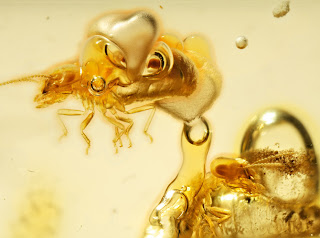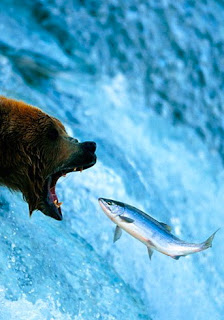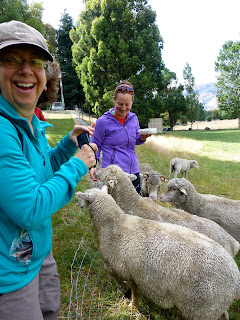If you really want to get on my good side, you’ll find me a fossilized termite fart. Nothing would please me more. I wasn’t even aware that such a thing existed until I perused a National Geographic magazine and there it was: a blob of amber, or fossilized tree sap, containing a termite in flagrante pootus. What a find! I thought. What are the odds that a booger of tree sap would not only trap a termite but preserve his gaseous eruptions for eternity? I was reminded of the photograph of the grizzly bear standing in the stream, his toothy jaws perfectly framing a doomed, leaping salmon. One-in-a-billion shot, I thought. Then I saw more and more of them. Apparently, one needed only to come to the right spot and set up a tripod. A significant portion of the salmon population travels to the ocean to gain weight for three or four years and then finds its way back to the waters of its birth following a primeval instinct to become bear poop.
Turns out the fossil termite farts are the same kind of deal. Tree sap has buried plenty of termites over the years, inasmuch as they are in the wood-chomping business, and trees tend to be mainly wood. And it further turns out that termites do only two things: they chomp wood, and they fart. It’s not easy to metabolize wood: it takes a village of bacteria to do it. The bacteria are working in permanent overtime status, and as a result, termites are a regular methane machine.
Literally: 1/4 of the methane production of the world can be traced to termites. It’s a problem, because methane is a major greenhouse gas, more potent in disrupting the climate than even carbon dioxide. Fans of fossil fuel consumption like to hold up the lowly termite as the villain in this piece, but it should be noted that the termite population has not changed much over the millennia, so their contribution to the atmosphere in the form of farts is probably static and they are not to be blamed for the current spike in greenhouse gases. “But if we could get rid of all the termites,” they say, “couldn’t we keep pumping all that fossil fuel into the atmosphere for another hundred years?”
As if. Tom Delay was in the pest-control business and even he couldn’t get rid of all the termites in the world. This stuff is hard. We can’t even bring down the numbers of Republicans infesting the House of Representatives with The Vote and access to factual information.
Termites are not the only source of methane, however, as I am in a particularly good position to know. But even outside our house, there are animals producing more than their allotment of methane. Herbivores, mostly. Cows and other vegetarians are famous for it. It isn’t easy to digest plant material. Cows can’t even do it without throwing up a little in their mouths. And since we have artificially augmented the planetary number of tasty cows, there has been an uptick in flatulence traced to bovines. It’s a problem. New Zealand was the first country to try to do something about it. Not cork the cows; but try to mitigate damages to the atmosphere in a responsible way, by assessing a tax on the owners of cattle and sheep, of which they have a great many.
This is a sensible approach. One of the reasons greenhouse gases have gotten to be such a terrible problem is that the things that produce them are artificially cheap, because no one is being asked to pay for cleaning up after them. Those who whine about the free market and how vital it is are sitting on top of a stacked deck. If the consumers of fossil fuels, and hamburger, were required to pay the full cost of their use, the free market would reflect some way different choices. “I guess I could take the train and eat fewer bananas,” we’d say.
It’s a simple concept. If I poop in your well, I owe you. For some reason, though, we give people a pass, if they have really massive amounts of poop, and the well is only the atmosphere that has sustained us. An atmosphere that, true, has had different compositions in different eras, producing climates that have varied over time; but if we had our druthers, and a clear choice, we’d probably opt for the climate that allowed us to flourish, and not the one that only sustains termites.
So yes. New Zealand attempted to tax the purveyors of livestock to counter their emissions. And the idea was batted down rather handily, once opponents began calling it a “flatulence tax.” Hell, people get traction here talking about Death Taxes, even though no one has ever been taxed for dying, or Job-Killing Taxes, whatever that means. This, on the other hand, really was a flatulence tax. That doesn’t mean it wasn’t a good idea.



The termite situation could be another source of fat for the big pharma coffers, sell liiittle tiny termite biotics. If New Zealand flatulence tax was chopped because of a name, change the name. Chicago has been the Windy City forever. Accepted. New Zealand could be Windy Paradise CaCa Tax.
Or the Anti-Inflation Tax.
Dare I say it: this post is a gas.
I'm still up in the air about it.
Note to self: stop chomping on wood…maybe I'll become more acceptable socially.
Mmm, wood.
Well my dogs consumes massive quantities of sheep poop does that mean a double tax :0!
I'm not sure WHAT that means, but this is why I don't kiss dogs.
Termites. Interesting little beasties. The galleries they build to shelter them from light when they're eating your house are composed of just 3 things: grit,shit and spit.
The first test to determine their presence is to listen for the sound of chomping.
Never heard them fart, though…
Well, it's hard to hear over the chomping.
hahaha!
Yes but is there a way we can tax the damn termites?
Termites have a notoriously tight hold on their little wallets.
If termites are such champion farters, the air inside termite mounds must be pretty intolerable. Given that they've evolved to survive in such conditions, it's no wonder they're difficult to exterminate.
Our best hope might be an increase in termite intelligence to where they start having the same kind of aspirations as stone-age humans did — such as discovering fire. One spark in that atmosphere and BOOM! The whole termite mound would go up in a miniature mushroom cloud.
Postal workers are difficult to exterminate for the very same reasons, but it looks like the powers that be are going to be able to exterminate them.
Do you have any data on what would happen to the methane levels if we all became vegetarians and thus reduced the number of cattle, sheep, etc currently pumping methane into the atmosphere? This is a serious question. I've read that the world's food supply could be multiplied if all the acres supporting animal-for-food production were instead turned to grain production for a vegetarian population. Now you've made me wonder if we'd be any further ahead in terms of methane.
And, as usual, entertaining post 🙂
That probably depends on the relative efficiency of bovine and human digestive systems, and whether vegetarian humans would increase their own methane production enough to make up for the farm animals' decrease.
My personal acquaintance with vegetarian roommates suggests that human methane production would increase to the point of serious household discord.
Maybe I'll add this to my growing list of things to search for on the interwebs. Amazing what is out there.
I like that thing that keeps generating great photos–"I can't go to bed, there's epic shit on the internet."
What is true of cows was also true of the giant plant-eating dinosaurs as well. Just imagine what the Earth's atmosphere must have been like after millions of years of that. The dinosaurs died out in a global firestorm supposedly triggered by a meteor, but I'm not buying it. I'm betting that eventually a spark happened somehow and it detonated the whole atmosphere. The meteor is just a cover story to avoid embarrassing the dinosaurs.
Infidel, you wild thang, I think I love you.
Yay for the flatulence tax. But why stop at farm animals? I can think of a politician or six who I believe fart on a continuous basis. And if the tax took off it might even benefit the economy. Brilliant (as always) post Murr. Thank you.
It wouldn't be equitable. It would hit the vegetarians harder, and that's probably not what we want to discourage.
Dear Murr, I thought I'd take a leisurely stroll through a number of blogs today and get back into the groove after being away for about three weeks. And what do I find? You, thinking deeply about concerns that affect all of us. And you, enticing me to think along with you.
My brain hasn't been doing much thinking since March began and here I am now pondering taxes and flatulence and the way so many people in business get by with taking advantage of the rest of us. And then to get me thinking about Congress, oh, I'm going to have to make myself some tea to calm down.
On a serious note: thank you for weighing in on this. You've given me a lot to think about. Peace.
I'm mightily distracted by the tax business now too, but as a good liberal it's not the paying that bothers me–it's the figgerin' it out. How can they make it complicated that educated people can't understand it?
Dear Murr, with regard to taxes, it's clear that all bureaucracy likes to make things obscure. Making sentences/ideas/concepts abstruse and unfathomable must make some little bureaucrat truly happy! The same type of person who develops ways to torture others!!!!!! Peace.
I read somewhere that vegetarian poo has very little odor. Is that because the smell has already been dispensed gaseously?
Or maybe because it's not made largely of rotten meat?
We'll need to run a double-blind test. Volunteers?
It's said that there is one ton of termites in the world for every person. That's seven billion tons of termites, which works out to…..a heck of a lot of termites. So the magnitude of their methane contribution is very plausible. I still think global termiticide is worth a try. Because otherwise we'll probably need to deal with global warming by dumping vast amounts of iron in the oceans to stimulate plankton blooms to absorb the carbon dioxide, and then it's good-bye ocean ecosystems. If we've got a choice, I'd rather lose the termites than the dolphins.
The way it works though is that somehow–SOMEHOW–losing the termites will doom the dolphins. Maybe we should back quietly away from everything.
Termites are the hope of the future. The more termites that are born, the better the chance that one of them will figure out how to save the environment.
Now you're going to have me peering at them, trying to find which one is the genius. Like looking for the new Dalai Lama.
It will be the one who remembers which prayer beads, bell and vajra belonged to it in its previous lifetime.
I can't even find my current vajra.
My vajra has been dry ever since perimenopause kicked in. I wonder if it has something more to do with methane than hormonal changes. Hmm…
Termite farts???? I cannot imagine so much from so little. If you pull my dad's finger…well, THAT is a fart!!!!!
Termites have SIX fingers.
Fossilized termite farts…this is most definitely the most original post of all-time on Blogger 🙂
Oh, stick around. 🙂
At their max there were 66 million bison roaming the plains and woodlands of America, eating grass and belching lots of methane. Currently 89 million head of cattle and calves (January 1. Those eating grain produce much less methane than those eating grass so we are likely on par with the bison. Without cattle and sheep the worlds grasslands would produce no food for humans unless we let the bison loose again and hunt them. Sounds like fun? And much of the grain used for livestock production is NOT human type food and is grown in crop rotation with human type food.
Self Treatment Of Flatulence can be done by the control of diet. Additionally avoiding chewing gum and smoking is recommended which will prevent deglutition of gas. Alpha-galactosidase is the dietary supplement which can help treat flatulence. Other than this over the counter charcoal tablets are present which help absorb excessive gas in the digestive tract.